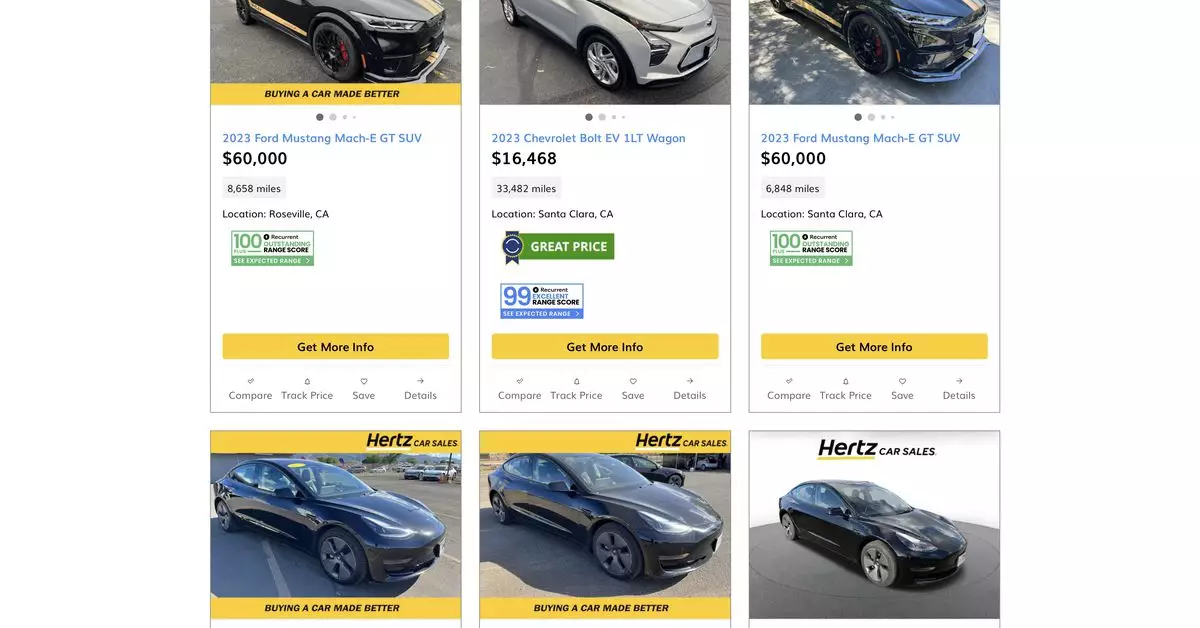As more consumers gravitate towards electric vehicles (EVs), rental companies are adapting their business models to keep pace with changing preferences. A recent initiative by Hertz has the potential to redefine the relationship between renters and their rental cars. By offering rental vehicles for sale at competitive prices, Hertz is not only addressing consumer desires but also navigating the complexities of the EV market with strategic foresight.
Hertz has reached out to customers renting various electric vehicles, inviting them to consider purchasing the cars they are already using. Recent reports indicate that renters have received appealing offers on models like the Tesla Model 3, Chevy Bolt, and Polestar 2. For instance, one renter was quoted a purchase price of $17,913 for a 2023 Model 3, aligning closely with pricing on Hertz’s own used car sales platform, despite the vehicle accumulating around 30,000 miles. The appeal lies in the pricing, which often undercuts standard used car options, making it an attractive proposal for many renters.
This strategic pivot towards enticing renters with the possibility of purchase does carry some transactional transparency. Hertz’s initiative provides a limited warranty on these used EVs, typically encompassing a 12-month or 12,000-mile powertrain warranty, along with a buy-back option within seven days. Such guarantees can alleviate the common apprehensions associated with buying a pre-owned vehicle, especially in the burgeoning EV sector, where buyers may be uncertain of battery health and long-term reliability.
Shifts in Corporate Strategy and Market Expectations
Hertz’s recent moves reflect a growing trend within the rental market as companies attempt to balance supply and demand while boosting profits. The organization’s earlier ambitions to create an extensive electric rental fleet faced setbacks last year due to disappointing customer demand and the inherent complexities tied to EV repairs. Adjustments were necessary as rental companies, which typically thrive on quick turnover, grappled with the longer timelines associated with maintaining and servicing electric vehicle technologies.
The hesitancy surrounding certain models, such as the Tesla Model 3 and the Polestar 2, resulted in Hertz retracting its purchase plans for these cars. This retraction raised crucial questions regarding adaptability and foresight for the future of electric vehicle rentals. In February, Hertz cut back on its intention to expand its EV fleet, signaling that navigating the electric vehicle landscape is not as straightforward as it may seem.
By connecting current renters to sales opportunities, Hertz not only fosters customer engagement but also boosts its own visibility in the used car market. Communications Director Jamie Line noted that this strategy was designed not merely as a marketing tactic but as a way to cultivate awareness about Hertz’s sales offerings. Renters who might not have initially considered purchasing an EV may find themselves more inclined to do so when faced with viable options.
This gradual shift in strategy marks a critical acknowledgment of the changing landscape of mobility. As consumers become increasingly eco-conscious and open to electric vehicles, rental agencies will need to remain agile and inventive to thrive. Hertz’s efforts may very well set a precedent for how rental companies can blend renting and ownership into a symbiotic relationship, paving the way for a greener future in transportation.


Leave a Reply